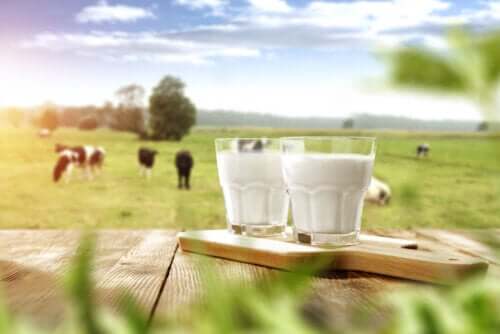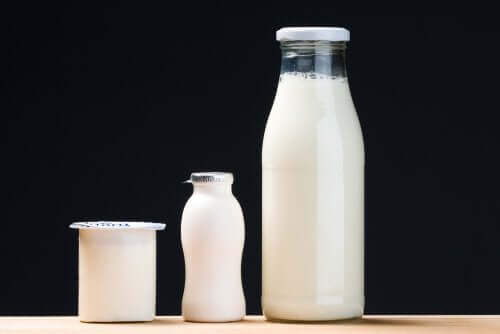Is It Unnatural to Drink Milk from Other Animals?
Our milk and the milk from other animals is a fluid produced by the mammary glands. It includes components that come from the mother's breast and bloodstream. In fact, nature designed it to make the offspring survive and develop.

There’s no doubt that drinking milk from other animals isn’t necessary for people to follow a healthy diet. However, since humans tamed animals, they adopted the habit of drinking this fluid as part of their diet. Nowadays, the most common types of milk people consume come from cows, sheep and goats.
The most important characteristic of other animals’ milk is its richness. This is because nature designed it to nourish newborn babies. On the other hand, its main flaw is its specificity, because it’s designed to feed newborn babies.
Is it natural to drink milk from other animals?
Milk consumption is a controversial issue within the world of nutrition. So, it’s ok to wonder whether it’s healthy or not. Next, we’ll talk about some benefits of drinking milk. Then, you’ll decide if you want to include it in your diet.

It’s a biological fact that when we’re born, we have the ability to tolerate the high amount of lactose present in our mother’s milk. After weaning, this ability eventually reduces, and this is the main cause of lactose intolerance. Actually, 70% of the adult world population is lactose intolerant.
Another fact is that for many centuries, people from the north of Europe lived in lands with severe weather conditions, and they had a hard time working the land. Therefore, they found a way to survive using dairy products. In order to do that, they bred farm animals. And, by natural selection, people from those areas suffered from a genetic mutation that allowed them to tolerate lactose during their adult age.
Moreover, food theft among different animals (kleptoparasitism) is quite common. It’s a survival strategy that birds, rodents, etc. practice. But, let’s face it: only humans turned it into an industry.
Is milk from other animals part of a healthy diet?
As we all know, milk is a fluid full of nutrients, which can be good for your health in many ways. Among its components you’ll find calcium, phosphorus, vitamin B, potassium and vitamin D. In addition, it’s an important source of proteins. At present, milk from different animals is considered nutritious food.
However, it’s important to know that, even though milk is a nutrient-dense food, it’s not essential. For example, you can find high levels of calcium in leafy green vegetables, such as seaweed, arugula, cabbage and mustard greens.
Moreover, it’s important to remember that in order to absorb calcium, the body needs vitamin D. When there’s not enough of this vitamin, the body uses the calcium from the bones. As a consequence, bones debilitate. So, if you’re not a milk fan, there are many products you can consume instead. For example, sugar-free yogurt has the same amount of proteins, calcium and phosphorus as milk.

What about children? Do they need to drink milk?
In spite of the controversy that surrounds this topic, it’s a fact that humans don’t need milk from other animals. Therefore, milk should be offered as an option, and not an obligation. So, if a person chooses to drink milk or not, it should be because of a personal preference instead of a doctor’s recommendation.
Without a doubt, the only nutritional requirement for babies is their own mother’s milk. And, when breastfeeding isn’t possible, there are special formulas to feed babies.
During adulthood, milk isn’t for everybody
Even though milk can be a good choice for some people, others may not tolerate it or choose not to drink it. Some people decide not to drink milk or consume dairy products because of dietary restrictions, while others may not do it because of health problems or ethical reasons. This is the reason for the production of different types of milk, such as almond, coconut, cashew, soy, hemp, oatmeal and rice milk.
When choosing a milk substitute, it’s important to bear in mind that many of these products may have certain ingredients, such as sweeteners, artificial flavors, preservatives and thickeners.

